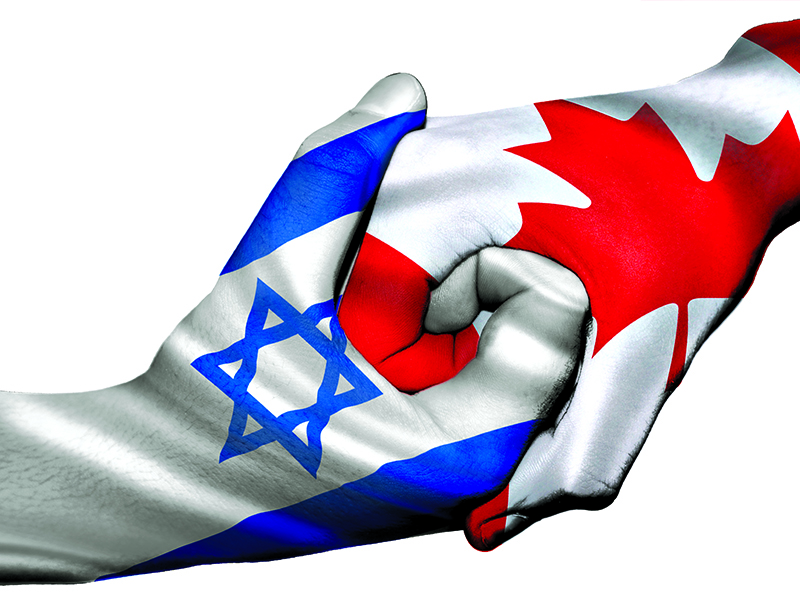Members of Parliament have approved the updated free trade agreement between Canada and Israel, but not without debate.
Bill C-85, which amends the Canada-Israel Free Trade Agreement Implementation Act to update the 22-year-old deal, was passed on Feb. 8, “on division,” meaning that some MPs were opposed to aspects of the deal.
New Democratic MPs took the government to task because they said the revised trade deal does not protect Palestinian rights and ignores the party’s suggestion that products made in the West Bank should be labelled as such, instead of as “made in Israel.”
READ: CANADA AND ISRAEL SIGN ‘MODERNIZED’ FREE TRADE AGREEMENT
In place since 1997, the Canada-Israel Free Trade Agreement (CIFTA) was renegotiated last spring. It is now “a modern, forward-looking trade agreement that would better serve the sophisticated Canada-Israel trade relationship,” Liberal MP Bardish Chagger told the House of Commons, speaking on behalf of Trade Minister Jim Carr.
Two-way trade between Canada and Israel has tripled since the deal was implemented, reaching $1.7 billion last year, Chagger noted.
The agreement was updated to address gender issues and corporate social responsibility. It has a new chapter on labour and, for the first time, new rules on environmental protections, Chagger stated.

Canada’s “strong friendship and partnership with Israel spans more than 70 years and stretches back even further to the arrival of the earliest Jewish settlers in Canada more than 250 years ago,” she said, noting that there are more than 350,000 Jews in Canada “who are an important source of information and support in the political and commercial spheres for both Canada and Israel,” and some 20,000 Canadians currently living and working in Israel.
But Alexandre Boulerice, an NDP MP from Quebec, asked why the Liberal government rejected an NDP amendment to the deal that would have required distinct labelling on products originating from “illegal Israeli settlements,” so they could be distinguished between companies in Israel and those “on the Palestinian territory that has been illegally occupied since 1967?”
Ontario Conservative MP David Sweet replied that that “there may be no better friend to Canada than Israel.” He said we need to ensure that Israeli businesses continue to be able to hire Palestinians from the West Bank “without the crazy pressure from this boycott, divestment (and) sanctions movement that does not understand that they actually employ and allow Palestinians to prosper, to have jobs that are not in the Palestinian Authority.”

He said he feels “very bad for the innocent Palestinian people who suffer every day under tyrannical regimes like Hamas and for those people who suffer under the corruption of the Palestinian Authority.”
Most of the opposition to CIFTA came from Cheryl Hardcastle, an Ontario NDP MP who said that while her party is not opposed to a free trade agreement with Israel, it has “serious concerns about the lack of human rights protections contained in the act, particularly relating to the rights of Palestinians in territories occupied by Israel.”
She said the NDP tried to address those concerns in committee hearings, but all their amendments were voted down.

Hardcastle recalled that in 2017, the Canadian Food Inspection Agency ruled that wines made in the West Bank could not be labelled as products of Israel. The agency said Canada does not recognize post-1967 territories as part of Israel and that labelling products made there as produced in Israel was misleading and in contravention of the Food and Drug Act.
Following the directive, the Liquor Control Board of Ontario told its vendors to pull Israeli wines from store shelves.
But following a strong backlash, the CFIA reversed its order, saying that the free trade deal between Canada and Israel indicates the wines could be sold as “made in Israel.”

“This is not acceptable,” Hardcastle said.
The West Bank, “where illegal Israeli settlements have proliferated, remains occupied territory,” she said. “Bill C-85 appears to cover the products made in Israeli settlements in the occupied territories. Neither Canada nor the United Nations recognizes these settlements as part of Israel. These settlements are illegal.”
Canada’s trade policy does not align with its foreign policy, she added.
Speaking strongly in favour of the revised trade deal with Israel were Liberal MPs Darrell Samson and Nick Whalen, as well as Conservative MPs Kevin Sorenson and Dan Albas, who noted that one of the top exports from Israel to Canada is electronics, while one of Canada’s biggest exports to Israel is industrial machinery.
In May, Federal Court will hear a challenge to the importation and sale of wine made in the West Bank but labelled as a “Product of Israel,” which was brought forward by Winnipeg resident David Kattenburg.
